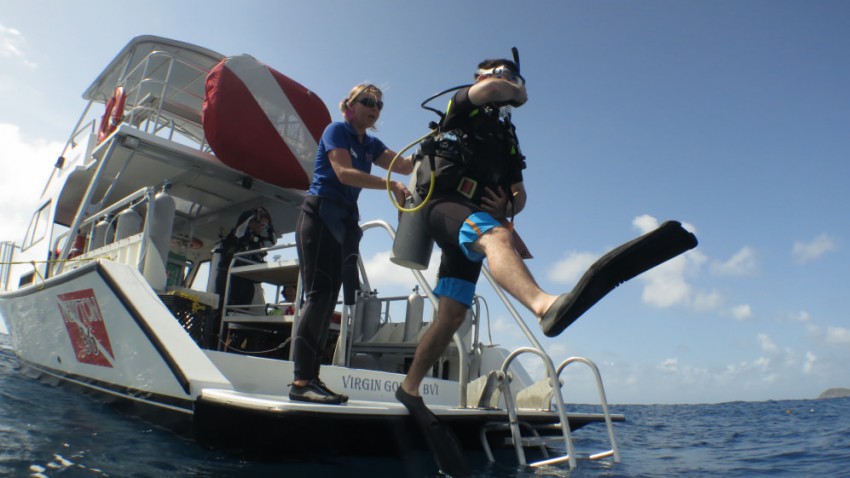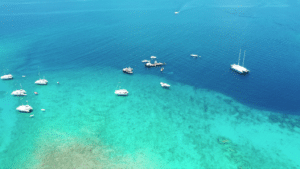
So you want to be a Dive Professional?
Do you love scuba diving and want to make your passion your career? By becoming a dive professional you really can live the dream. You have the opportunity to live and work in the most beautiful corners of the world, meet new people every day, and help new divers to gain confidence underwater.
But how exactly do you become a dive professional? There are a few steps to take before you can start teaching. To make it easy, we have made a step by step guide to becoming a professional SSI scuba diver.
How to Become a Dive Professional
1. Try Scuba
The Try Scuba program does exactly what it says on the tin, it allows new divers to ‘try scuba’! If you have never tried scuba diving and you are not sure that you want to commit to a full certification course, sign up for the Try Scuba program.
You will learn the basic theory behind scuba diving, including safety and equipment. An instructor will be close by the whole time as you take your first breaths underwater and dive to a maximum depth of 12 meters (40 feet).
If you are confident that scuba diving will be the sport for you, you can skip this step and go straight for the Open Water Diver certification…
2. Open Water Diver
The Open Water Diver program is the first real step on your journey to become a dive professional. This course involves a mix of theory, confined water, and open water sessions.
You will learn in-depth dive theory and safety, including how to be a good dive buddy, how to plan your dives, and how the equipment works. By the end of the course you should be confident to dive independently with a buddy or in a diving group, up to a maximum depth of 18m/60ft deep.
As an Open Water Diver, you will be able to take part in guided dives and enjoy scuba diving anywhere in the world!
3. Specialty diver / Advanced Open Water Diver
Now that you are a certified Open Water Diver, you can start to learn more about the areas of scuba diving that you enjoy most. Whatever your passion is, there is an SSI Specialty that suits you.
You can choose from over 20 individual programs, and when you complete a certain number of specialties you will also automatically earn the SSI Specialty Diver, SSI Advanced Open Water Diver, and SSI Master Diver ratings.
Some of these specialties include:
- Perfect Buoyancy where you can learn all about how to hover and move in the water like a pro.
- Navigation where you learn how to find your way around a dive site and back to the boat or shore.
- Deep Diving where you will gradually take your diving to a depth to 40 meters (130 feet), which is the maximum allowed depth for recreational scuba diving.
Check out SSI’s advanced diver training for more options of specialties that you can choose to take.
4. Dive Guide and Divemaster
Becoming a dive guide is the first step where you get to interact with students in the water. As a dive guide you will give dive briefings, perform dive site evaluations, and lead the dives! This means you will be in charge of navigation under the water, and showing people cool marine life along the way.
You can begin your career here or continue learning to become an SSI Divemaster, so you can work as an assistant to dive instructors when they are teaching courses. This is often paid work, and you can stick as a divemaster and find work guiding dives around the world.
However, teaching courses will provide you with more money and more work opportunities. Since instructors can guide dives as well as teach courses, they are more valuable to hire.
5. Assistant Instructor
The next step you can take is to become an assistant instructor. You will gain experience not only assisting dive instructors on courses, but by teaching students yourself under the supervision of an instructor.
This is a valuable experience before becoming a dive instructor and starting to teach alone. Observing different instructors allows you to observe various teaching styles and practice what yours is, with help and advice on hand if you need it.
6. Open Water Instructor
Now, you are ready to become a scuba diving instructor! The first part is to complete the Instructor Training Course (ITC), and then you will enroll in an Instructor Evaluation (IE) to finally qualify as an SSI Open Water Instructor.

This is a ten day training program which will certify you to teach various key SSI programs independently, including: Scuba Diver, Open Water Diver, Enriched Air Nitrox, Diver Stress and Rescue and Dive Guide.
7. Specialty Instructor / Advanced Open Water Diver Instructor
After gaining experience as an Open Water Instructor you can progress to become a Specialty Instructor and start teaching the SSI specialties. Once you have taught enough specialties you will automatically qualify to be an Advanced Open Water Diver Instructor. After this you can become a Divemaster Instructor and help Divemaster trainees achieve their Divemaster status.
8. Assistant Instructor Trainer and Instructor Trainer
The final step is to become an Instructor Trainer, then you can teach the Instructor Training Courses and perform Instructor Evaluations to qualify brand new Open Water Instructors.
Before you can do that though, you must work as an Assistant Instructor Trainer and help the Instructor Trainers on the courses, while learning from them and gaining experience.
Being an Instructor Trainer is a huge responsibility, it would be your job to decide if someone is ready and trustworthy enough to become an instructor!
There are prerequisites to all these programs, so it is a good idea to check that you have all you need before signing up. For example, check the minimum number of logged dives or minimum swimming ability. You can find these prerequisites on SSI website before you sign up for a program. You will also need to sign a medical questionnaire to ensure you are fit to dive.
If you want to discuss further, please email info@divebvi.com and we’ll be happy to discuss options!
Article from our friends at DiveSSI.com

Cruise Passengers
Are you planning a cruise to the BVI, the Gem of the Caribbean?
Cruise ships who stop in Tortola (Roadtown), BVI give guests the opportunity to dive or snorkel with us! We are located on the beautiful island of Virgin Gorda but with prior reservations made, we can deliver a high-end Private Charter experience for you and your guests in Tortola. We specialize in fun and safety and have been setting the standard for BVI diving since 1975.
Trip options include:
- Dive the Wreck of the RMS Rhone!
- Private Charter a boat!
- Custom-designed trip – let us know what you want to experience
Arrangements must be made in advance directly through Dive BVI. Email us today and set up your BVI Adventure of a Lifetime!


BVI Weather
The British Virgin Islands are blessed with cool trade winds and warm blue water. Our average daily temps are 80 – 86 F. At night, the temperature drops about 10 degrees. For the water lovers, January water temp is 76, March gets you 80, and it’s 83 in July. Late August can be around 85 F.
It’s a good idea to bring a light jacket or long sleeved t-shirt for the evening hours as it does cool off a bit. Reef-safe sunscreen is essential and we have a large selection in all of our stores to choose from. A hat or visor and sunglasses will also make your day on the water a lot more enjoyable. Don’t forget the sunglass keeper either!
If you check the daily forecasts, you’ll probably see that it shows showers just about every day. Not to worry, we typically see a late afternoon shower due to the diurnal and topographic effects of the islands. These showers start and end quickly and help keep the islands green and beautiful.
There are only a few days each year that we aren’t able to go out diving due to sea conditions. We are constantly monitoring the weather and water conditions and will not send the boats out if we deem it unsafe. That being said, there are numerous fun things to do on Virgin Gorda so don’t ever let the weather slow you down. We usually have a weekly forecast printed out so stop in and see what it “might” be like out there.
